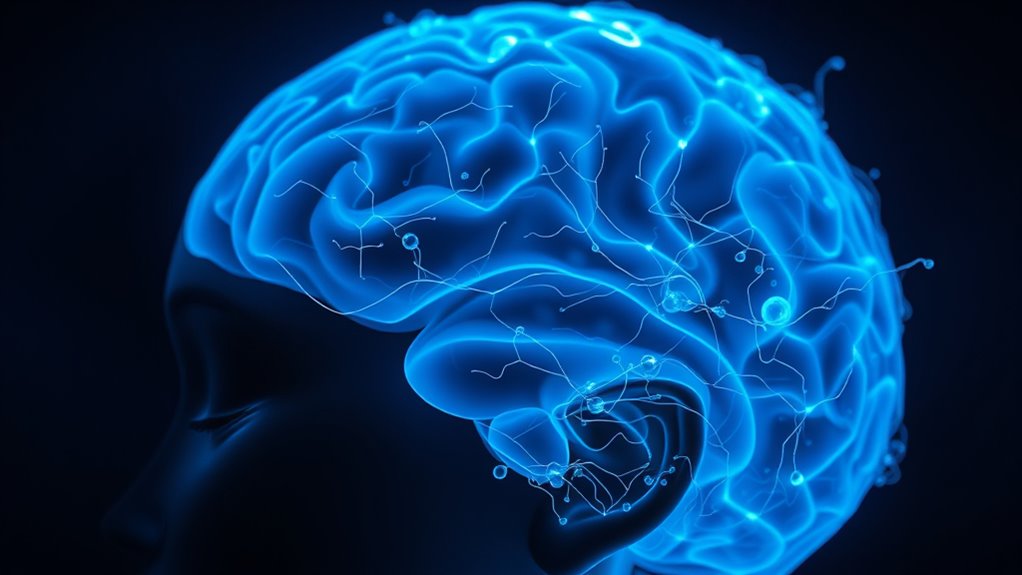The glymphatic system acts as your brain’s cleaning crew, removing waste products like beta-amyloid and tau proteins during sleep. When you rest, spaces between your brain cells expand, allowing cerebrospinal fluid to flow more freely and carry away toxins. This process helps prevent buildup that could damage your brain over time. If you keep exploring, you’ll uncover how this system supports your long-term brain health and wellness.
Key Takeaways
- The glymphatic system clears brain waste by transporting cerebrospinal fluid during sleep.
- Sleep causes brain tissue spaces to expand, enhancing waste removal via increased fluid flow.
- It removes harmful substances like beta-amyloid and tau proteins linked to neurodegenerative diseases.
- Proper sleep is essential for the glymphatic system’s efficient function and brain detoxification.
- Impaired glymphatic activity can lead to toxin buildup, cognitive decline, and increased risk of neurological disorders.

The glymphatic system, a network in your brain that clears waste, becomes highly active during sleep. This system fundamentally acts as your brain’s cleaning crew, working efficiently when you’re resting. When you sleep, the spaces between your brain cells expand, allowing cerebrospinal fluid (CSF) to flow more freely through the brain tissue. This increased flow facilitates brain detox, helping to remove metabolic waste products that accumulate during waking hours. Waste clearance is essential because it prevents harmful substances from building up, which could impair your brain’s function over time.
During wakefulness, your brain produces waste like beta-amyloid and tau proteins, which, if left unchecked, are linked to neurodegenerative conditions such as Alzheimer’s disease. The glymphatic system kicks into high gear during sleep to flush out these toxins, effectively cleaning your brain. Think of it as a nightly deep-cleaning process that you don’t have to consciously manage. The more restful sleep you get, the more efficiently this waste clearance occurs, reducing the risk of toxin buildup that can damage brain cells.
Sleep activates the glymphatic system to clear brain toxins like beta-amyloid and tau proteins.
This process relies on the unique architecture of your brain’s vasculature and the support of glial cells, which help regulate fluid movement. When you’re asleep, the brain’s interstitial space—the space between cells—expands by about 60%, allowing for a surge in CSF flow. This increased flow carries away waste products and transports nutrients to brain tissue. Without enough sleep, this clearance process slows down, and waste can accumulate, potentially leading to cognitive decline or neurological issues over time.
Understanding the importance of the glymphatic system highlights why sleep isn’t just about rest—it’s an essential period for brain maintenance. If you frequently sacrifice sleep, you’re impairing this brain detox process, which could have long-term impacts on memory, concentration, and overall brain health. Ensuring good sleep hygiene allows your brain’s natural waste clearance to work at its best, keeping your mind sharp and healthy. In essence, sleep acts as a reset button for your brain, enabling it to clear out toxins and prepare for a new day of mental activity. Recognizing how critical this process is underscores the importance of prioritizing quality sleep for your brain’s long-term well-being.
Frequently Asked Questions
How Was the Glymphatic System Discovered?
You might find it fascinating that the glymphatic system’s discovery was a result of a historical breakthrough by pioneering researchers in neuroscience. They used advanced imaging techniques to observe the brain’s waste clearance processes during sleep. Their work revealed how cerebrospinal fluid moves through the brain, cleaning out toxins. This discovery transformed our understanding of brain health and sleep, highlighting the importance of this hidden cleaning system.
Does the Glymphatic System Function Differently With Age?
Imagine your brain as a busy city, where waste needs clearing each night. As you age, this city’s cleaning crew slows down, making it harder to remove debris. The glymphatic system doesn’t work as efficiently, increasing neurodegeneration risk and impacting sleep quality. You might notice more restless nights and forgetfulness. Keeping active and prioritizing good sleep can help support this crucial system, even as years go by.
Can Lifestyle Changes Improve Glymphatic System Efficiency?
You can boost your glymphatic system efficiency through lifestyle changes. Focus on diet optimization by eating anti-inflammatory foods rich in antioxidants, which support brain health. Manage stress with regular exercise, meditation, or relaxation techniques to reduce cortisol levels that impair clearance. Prioritizing quality sleep also enhances glymphatic function. These habits work together to keep your brain cleaner, healthier, and better equipped to remove waste efficiently.
Are There Any Health Conditions Linked to Glymphatic Dysfunction?
Imagine developing early signs of Alzheimer’s disease, often linked to glymphatic dysfunction. Research suggests that sleep disorders can impair this system, leading to a buildup of toxins like beta-amyloid. When your glymphatic system doesn’t work properly, you’re at higher risk for neurodegenerative conditions. Maintaining good sleep hygiene and addressing sleep issues might help prevent or slow down such health problems, highlighting the importance of a healthy sleep routine.
How Does the Glymphatic System Interact With Other Brain Cleaning Mechanisms?
You might wonder how the glymphatic system interacts with other brain cleaning mechanisms. It works alongside processes like neurotransmitter clearance, helping remove excess chemicals that could disrupt brain function. During sleep, cerebrospinal fluid exchange is enhanced, supporting this teamwork. Together, these mechanisms maintain brain health by efficiently clearing waste, ensuring your brain operates smoothly and reducing the risk of neurodegenerative issues.
Conclusion
Now you see how the glymphatic system acts like a medieval janitor, tirelessly clearing out waste while you sleep—only this time, it’s in your brain. Without this hidden crew, toxins would build up faster than a clogged alleyway. So next time you hit the hay, thank your brain’s secret service for keeping you sharp and healthy. Remember, even in the age of space travel, your brain’s cleanliness remains a timeless priority.









